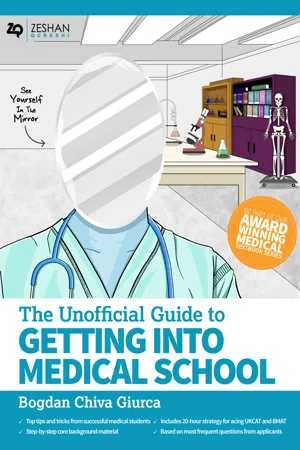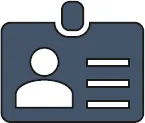INTRODUCTION: SETTING UP THE SCENE
Bogdan Chiva Giurca
Why Medicine?
Application Timeline and Key Dates
Where to Start? Create a Portfolio, Find a Mentor, and Come Up With a Plan!
A Short Unofficial Guide to Medical Schools In the UK
Summary, Test Yourself, and Reflection
Resources
I would be unstoppable, if only I could get started!
WHY MEDICINE?
Right now is the time to arm yourself with a pen and spend some time on the most important question of your medical school application journey, your career as a doctor, and quite possibly the rest of your life. Your family, teachers, school mates, potential employers, and placement providers will all want to know this, but most importantly, YOU should know what fuels your passion for getting out of bed each day.
What makes you think you want to do medicine? What have you seen, done, felt, and thought over the years to make you consider a career in medicine? How tempted are you to say that you love the sciences and that you want to help people?
Sure, you want to make a difference in someone’s life and you certainly love the sciences, but can you make me believe this without stating the above word for word? What’s your story? Can you think of a way to portray yourself as an empathetic person who wants to make a difference without actually saying it? Can you give me an example that convinces me you love the sciences?
Do you know why it is so hard to provide a good answer for this question? It’s simple. You’ve spent most of your life in school, preparing for and answering questions that have a clear rationale that you can study for. ‘Why medicine?’, on the other hand, has no right or wrong answer. This question can only be answered using your life story and experiences. ‘Why medicine?’ is therefore the same as ‘Who are you?’ For some of the science geeks around, Carl Sagan once said, ‘You have to know the past to understand the present’… or in your case, you have to know your past to understand your WHY.
I remember being asked this during my medical school interview. As much as I wanted to give a serious answer that I had thoroughly prepared in my free time, instead I started giggling and smiling, because at that point I realised what a geek I am. Half-laughing, I told the interviewers that I was always that annoying child bombarding teachers with ‘what, why, how’ questions to the point of exhaustion. I told the interviewing panel that I could only focus for a few minutes when studying for other disciplines, but when it came to the sciences, I didn’t even notice time flying by. I remember staying up until the middle of the night laughing at geeky medicine stuff, like how doctors used to taste a patient’s urine (an ‘accurate’ test to see if a patient had diabetes or not). At this point you may think the whole interviewing panel looked very confused, but they all laughed, agreeing that it did indeed sound very geeky! This encouraged me to continue with my non-scripted answer, organically conveying my love for science and medicine.
Medicine is not just science, however. As a kid, my doctor explained to me how my airway swells up due to certain allergens. I didn’t care about the science behind this phenomenon, all I wanted to know was what was happening and why – I was only twelve, after all! The doctor mimicked ingesting an allergen, spoke in a funny voice, and used a balloon to explain what happens to my airway during an asthma attack. Whenever I went in for a vaccination, that same doctor would trick me into thinking the injection was pain-free, until I felt the needle and started crying. It made me laugh then but looking back, there was more to it. That awesome doctor used skills beyond science – in fact, this is where medicine overlaps with art. The art of communication, the art of listening, choosing the perfect words, and tailoring your practice to the patient in front of you. There are several examples that exemplify the ‘art’ of medicine, from breaking bad news to dealing with angry patients.
We are all unique in our own way, so our ‘Why medicine?’ is too. To inspire you, we have collected a couple of ‘Why medicine?’ examples from the authors of this book, all successful medical students with a passion for medicine.
It gives me heartache to see people suffer and lose opportunities in their lives because of illnesses. Often, the suffering is augmented by a lack of healthcare, which is unfortunately inevitable in underdeveloped areas.
On a school service trip to Thailand, I was shaken by the poor living conditions in rural villages, where inadequate medical care left some bedridden and unattended. Apart from cooking and delivering food to them, I wished that I could have done more to ease their discomfort by attending to their medical needs.
I realised that by becoming a doctor, I could help bring back health and life opportunities to those stricken with illness. I will remain forever captivated by this vision.
Gareth, Medical Student, Exeter Medical School
‘Why medicine?’ is a question I couldn’t answer for a long time. It was something I knew I wanted to do, deep down. It took a lot of reflection and soul searching to pick apart my motivations.
Primarily it is the pure satisfaction of using one’s skills and knowledge to pull people back from the edge of death and bring new life into the world. Being there for people in their best and worst moments, and being granted the privilege of doing something to help them, however small my contribution may be, means that I can give something back.
In today’s world we constantly hear about how humans are hurting one another or how bad things are. What is seldom mentioned is how people are also good, and how people can help one another too. Medicine was the best way I felt I could express that.
It was also a vocation that would give me everything I wanted in life – a job where I look forward to going to work in the morning, that allows me to make new friends and meet fascinating people, teaches me something new every day, and stretches my learning and abilities.
Jamie, Graduate Medical School Applicant
I believe the degree in medicine I am currently pursuing is only a gateway to the wonders of healing and helping people. It is the most sincere way I can give back to a community that has placed its trust in me during its most difficult times, both physically and emotionally.
Medicine also allows me to be the scholar that I have always aspired to be. I have sought the perfect mixture of knowledge and application. After a long couple of days in the hospital, I enjoy the clarity I get when I have the time to sit down and read something as simple as physiology or something as fascinating as a paper on the ethical use of social prescription in an age of allopathy.
Medicine opens so many windows into your personal interests by allowing you to develop insight into them; it helps you evaluate those skills or beliefs and integrate them into your practice. For instance, someone’s passion in educational opportunities may translate into educational solutions for chronically ill children. This is a marriage between your interests and the knowledge that you gain on the ground.
I wanted to commit myself to something that would help me build real-life skills and make a real-life impact every time I interact with people. I wanted to maximize my ability to guide others towards feeling physically and mentally healthy. Now in my third year of medicine, I truly feel like I am as much medicine as medicine is me – it is a part of my day the same way that brushing my teeth is (although some Sundays I leave it till after brunch!).
Akanksha, Medical Student, Bristol Medical School
I was curious to read more, curious to find out more, curious to understand how and why things happen the way they happen. It was my avid interest in the sciences that sparked my interest in medicine. However, it was engaging in...





